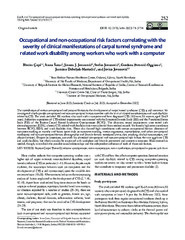Приказ основних података о документу
Occupational and non-occupational risk factors correlating with the severity of clinical manifestations of carpal tunnel syndrome and related work disability among workers who work with a computer
| dc.creator | Çupi, Blerim | |
| dc.creator | Šarac, Ivana | |
| dc.creator | Jovanović, Jovana J. | |
| dc.creator | Jovanović, Stefan | |
| dc.creator | Petrović-Oggiano, Gordana | |
| dc.creator | Debeljak-Martačić, Jasmina | |
| dc.creator | Jovanović, Jovica | |
| dc.date.accessioned | 2023-12-24T21:38:15Z | |
| dc.date.available | 2023-12-24T21:38:15Z | |
| dc.date.issued | 2023 | |
| dc.identifier.issn | 0004-1254 | |
| dc.identifier.uri | http://rimi.imi.bg.ac.rs/handle/123456789/1400 | |
| dc.description.abstract | The contribution of certain occupational and personal factors to the development of carpal tunnel syndrome (CTS) is still uncertain. We investigated which specific occupational and non-occupational factors correlate with the level of clinical manifestations and work disability related to CTS. The study included 190 workers who work with a computer and have diagnosed CTS (100 men, 90 women, aged 20–65 years). Subjective experience of CTS-related impairments was assessed with the Symptom Severity Scale (SSS) and the Functional Status Scale (FSS) of the Boston Carpal Tunnel Syndrome Questionnaire (BCTQ). The objective, neural impairments were tested with electrodiagnostics (EDX), whereas CTS-related work disability data were collected from medical records. We found a high inter-correlation between BCTQ, EDX, and work disability data. These also showed high correlations with certain occupational factors (duration of computer-working in months and hours spent daily in computer-working, certain ergonomic, microclimatic, and other occupational conditions) and non-occupational factors (demographic and lifestyle factors: nutritional status, diet, smoking, alcohol consumption, and physical activity). Despite its limitations, our study has identified occupational and non-occupational risk factors that can aggravate CTS and work disability, but which can also be improved with workplace and lifestyle preventive and corrective measures. More research is needed, though, to establish the possible causal relationships and the independent influence of each of those risk factors. | sr |
| dc.language.iso | en | sr |
| dc.publisher | Institute for Medical Research and Occupational Health | sr |
| dc.rights | openAccess | sr |
| dc.rights.uri | https://creativecommons.org/licenses/by/4.0/ | |
| dc.source | Archives of Industrial Hygiene and Toxicology | sr |
| dc.subject | Boston Carpal Tunnel Syndrome questionnaire | sr |
| dc.subject | nerve compression | sr |
| dc.subject | nerve conduction | sr |
| dc.subject | occupational exposure | sr |
| dc.subject | sick leave | sr |
| dc.title | Occupational and non-occupational risk factors correlating with the severity of clinical manifestations of carpal tunnel syndrome and related work disability among workers who work with a computer | sr |
| dc.type | article | sr |
| dc.rights.license | BY | sr |
| dc.citation.epage | 272 | |
| dc.citation.issue | 4 | |
| dc.citation.spage | 252 | |
| dc.citation.volume | 74 | |
| dc.identifier.doi | 10.2478/aiht-2023-74-3754 | |
| dc.identifier.fulltext | http://rimi.imi.bg.ac.rs/bitstream/id/3261/Occupational_and_non-occupational_risk_factors_correlating_pub_2023.pdf | |
| dc.type.version | publishedVersion | sr |

